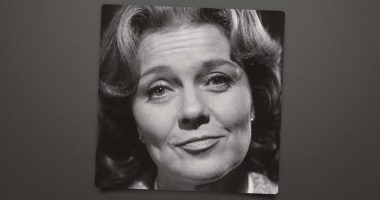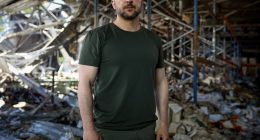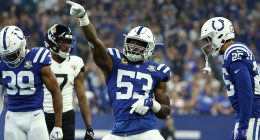[This story contains mild spoilers from the first four episodes, Part 1, of the final season of The Crown.]
Though it’s hard for Suzanne Mackie to imagine taking on another 10-year project like The Crown, the executive producer of the Netflix historical drama never once hesitated to be a part of the making of the series, despite how protective audiences can be of portrayals of the royal family.
“Ten years ago, we were starting in the 1950s and that was a period in history when most of us weren’t even born, so it felt remote and intriguing because of that,” says Mackie. “Being able to explore 1950s England and what society was like after the war was really interesting. It’s almost like a fairytale really, with a young Claire Foy becoming a sort of reluctant princess, then becoming the queen and destiny changing.”
Change has been a constant over the course of The Crown’s six seasons, the final of which is being split into two parts with the first half, which consists of four episodes, streaming on Nov. 16. (The final six episodes release Dec. 14.) In covering the period from Queen Elizabeth II‘s marriage to Philip, Duke of Edinburgh, in 1947 to the wedding of then-Prince Charles and Camilla Parker Bowles in 2005, Mackie and writer-creator Peter Morgan (The Queen) have ushered in several new actors to portray the royal family over the decades. The latest ensemble cast, which includes Imelda Staunton (Queen Elizabeth), Elizabeth Debicki (Princess Diana), Dominic West (Prince Charles), Olivia Williams (Camilla), Jonathan Pryce (Prince Phillip) and Lesley Manville (Princess Margaret), adds Ed McVey, Luther Ford and Meg Bellamy in the roles of Prince William, Prince Harry and Kate Middleton.
“It almost feels like bringing up a child,” explains Mackie of overseeing the series, which debuted in 2016. “There’s the sort of infant years, then the teenage years, and then you’ve got your grown-up child. It’s an extraordinary experience being partly responsible for everyone’s wellbeing, from production to Peter’s writing, the extraordinary directors we’ve had, and the three different stages of the crown.
“I don’t think I’ve worked on anything that’s had such a unique structure with the changing of the cast,” she adds. “It’s just amazing.”
***
Can you talk about introducing a new cast to portray the youngest generation of royals this season?
Oh, that was great. I feel very pastoral about everyone’s well-being, whether it’s Imelda or Lesley Manville or our brand new cast whose never done anything like this before. Watching them on the red carpet at the premiere felt like this was just the beginning of the rest of their career, the beginning of the rest of their lives. They’re so generous and open to everything, and full of optimism and excitement. You just want to preserve that. They’re so deserving of all the attention they get because they are very, very good. They brought such sincerity and commitment. And I know they’ll also be publicly scrutinized and watched and photographed, and they’ll have to go on their own journey of coming to terms with that. As a producer, you don’t have to go through that yourself, and I’m very aware of how young they are and you just want to protect them.
When did you realize what a cultural phenomenon The Crown was and how much attention people were paying to the details of each character’s story?
Very early on, in season one, really. People were very, very complimentary about it, and it was lovely and hugely rewarding, and a huge relief to get such a positive response. I think people were astounded by Claire and her portrayal of the queen. When I look back, it was such a beautiful performance and so beautifully pitched, and I think all our cast have been extraordinary. I remember Peter Morgan saying early on, “I don’t think there’s a duff performance in the first season,” and when I reflect on that, that’s absolutely right. Everyone’s pitch perfect.
And I think we’ve carried that through all the seasons. I think of Olivia Colman and Helena Bonham Carter, Tobias Menzies and now Imelda, who I think is just exceptional and an exceptional person, and Lesley Manville, who is exceptional as Princess Margaret. When people see episode eight, which is very much her episode, she’s so breathtakingly good. The two of them together, you think, “Wow.” So, from Claire Foy and Vanessa Kirby to Olivia Colman and Helena Bonham Carter to finally Imelda and Lesley, it’s a tour de force.
Peter’s written so much from the heart for those sisters. At the beginning of the journey of all this, no one could have predicted that, of all the characters he has, he just relished writing for those sisters. You think, “Well, you’re a man, how do you know? How would he know about sisters? What does he bring to that?” Yet, intuitively, it always felt so close to the truth.

In season five, there were two moments when the media was hesitant to put out a story about the royals for fear of potentially bringing down the monarchy: One, when the phone calls between Prince Charles and Camilla were intercepted, and the second being Princess Diana’s Panorama interview with Martin Bashir. Did you ever feel like you were in a difficult position when it came to choosing what stories to include in the series?
I don’t think any aspect of The Crown has ever mocked or sat in harsh judgment of something. Peter’s always been, I felt, watching and observing as a storyteller, and felt it was simply his responsibility to tell the story as he received it and not try to have such a moral judgment of it. So, for instance, with the Camilla-gate, when the phone call between them was leaked, I think he felt it was a terrible invasion of privacy. I remember when I read the transcripts thinking, “God, that’s so painful for them.” Peter felt that they were like young loves and, what an awful thing for that to be then paraded across the pages of newspapers for people to laugh at and mock; how would you stand that? I think he wanted to show how invasive that could be and to actually try and look at it from another point of view. And, again, he simply told the story. And that’s where he’s so clever. He doesn’t say, “This is what I think.” He tells the story and then he allows the audience to make up their own mind.
Can you talk about the decision to split this last season into two parts?
It was a decision that Netflix proposed, actually, and initially we thought, “Ooh, do we want to break something that’s working, frankly? Do we want to split the season in two? How does that feel?” But actually, I think when they described how it keeps it alive — there’s an anticipation that would grow between one part to the next part — I thought it’ll be really interesting in a way, almost selfishly, to prolong the release of The Crown, just because it does feel like it’s an event. It’s the final chapter of our story.
Then on a very practical level, it presented an opportunity to be able to switch our young William and our young Harry to a slightly older William and a slightly older Harry. And that William is the age where he goes to St. Andrews University and he meets Kate Middleton. And having the younger William, that wouldn’t have necessarily worked and it would have been slightly awkward to literally go from one episode to the next episode and go, “Ah, who’s that?” We’ve always done that, where we’ve changed cast, and you have to be very bold and very decisive about it and just do it. But I think that month gap that we have allows an audience to transition from the younger boys to now young men.

Do you jump ahead in episodes five and six [Part 2] with the aftermath of Princess Diana’s death?
We do. It’s not a big jump in terms of time, but it feels like a big jump emotionally. I have a complete soft spot for episode five. I think it’s exquisite, and I know Peter Morgan feels the same way. It’s very profound and it’s very moving. It’s beautifully performed by Ed McVey, and Dominic West is breathtakingly good, so I really can’t wait for people to see the episode. It can make me weep even thinking about it. It’s very much about father and son. I love that episode.
Mohamed Al-Fayed (Salim Daw) and Dodi’s (Khalid Abdalla) relationship is another father-son narrative that’s explored at length in the series. Can you talk about the importance of that storyline, particularly in lieu of the way Dodi’s memory was somewhat erased in wake of the loss of Princess Diana?
Peter talked about it 10 years ago. I remember it so clearly: We were first gathered together as a team, and he told the story of the queen and the difficult decision she had to make about coming down to London in the wake of Diana’s death. And he felt he couldn’t tell that story again because he’d already told it, and we all understood that. He said: The story I’m really interested in from that time is the Al-Fayeds. And I remember thinking, “That is so bold and so interesting, and I’m absolutely fascinated by that myself. I want to know that story.” I think you’re absolutely right; people don’t really know Dodi. They can picture him in the newspapers; they can picture him on his yacht. And Khalid, who gives an exceptionally sensitive and thoughtful portrayal of Dodi, recalled the sort of endless description of Dodi being one line, which was “Playboy,” and you think, “Wow, is that all?”
The custom of having to bury the dead within 24 hours, it’s extraordinary compared to Diana and the state funeral in London. Salim Daw, who plays Mohamed Al-Fayed, brings such raw emotion to it. He loves his son so deeply, and the loss of him was so vivid and real and raw and, in a way, any sort of mourning for his son was eclipsed by Diana. The whole world seemed to be grieving for Diana and there was no room for Dodi, there was no room for his recognition. And I think being able to tell that story and the really complex relationship between Dodi and his father, and what his desires were for his son and his ambitions for his son, in a way, the cruel irony of that is that that ambition, in many ways, inadvertently led to the tragic outcome.
What did researching their story look like, given there’s not as much archival information on them as the royal family?
As you know, we do so much research. There’s a really robust team that supports Peter, and all his ideas and ambitions are very, very carefully fact checked. We would read endlessly, watch endless documentaries, pore over letters, pore over articles, talk to people that might have known them. That goes on for weeks and weeks; it’s months of really painstaking research, and then you build up a picture. If Peter were ever sort of straying too far away from the truth, he would always be pulled back by the research team who would say, “Peter that’s not true, that didn’t happen, that couldn’t happen.” And sometimes, if we felt there was a need to dramatize something, then we’d make a very conscious collective decision that that decision was being made. Sometimes when we’re accused of making mistakes, we all feel very defensive about that because they’re not mistakes, they’re decisions. They’re creative decisions and nothing would ever be casually decided upon. It would all be very, very carefully considered. We’re hawkish about the truth, but also there’s a spirit of truth, and there’s accuracy, and you have to weigh it out very carefully as a team and make decisions.
We’re just coming out of the SAG-AFTRA strike now, but did the writers or actors strikes affect post-production?
No, not really, because we were already kind of finished. But in terms of the cast not being able to be present at various screenings, they were all very, very supportive of what the strike was about and why. They were fantastically in solidarity with the union, and the timing of the strike lifting was a blessing for us because we could all then come and celebrate together. Particularly for our young cast, their first experience of a launch of something like The Crown, which is high profile and gets a lot of attention, it would be such a shame if they were having to just read about it in the newspapers at home. We were lucky insofar as the timing; we finished, so it didn’t impact us terribly to be honest. But certainly, one felt the shock waves of it throughout the whole thing.

The death of The Queen Mother also happened during filming. How did that affect this last season?
We all stopped filming out of respect. We always knew if that event happened that we would always be very respectful.
Is there an episode this season that’s particularly significant to you?
I love all of the episodes of course. But episode 10 — apart from it being the finale — I think, is beautiful. It feels like a culmination of the long 68-episode journey we’ve been on. Stephen Daldry directed it so beautifully and Imelda is just breathtaking in it as the queen. One senses the queen’s absence, and through that episode you sense what she meant to us. Suddenly, it feels like she’s gone and so it feels like the ending of The Crown coincides with the end of her reign. It has a dignity to it and sort of a deep respect and affection for her. You can’t help but feel that.
How did you know 2005 was the right year to end the story of The Crown?
Peter knew right at the beginning, 10 years ago, that it would be 2005. He always said, “I want to end around the time when Camilla and Charles got married.” I always see it in a rather fairytale way. Like, that’s the end of our journey: Peace is restored to the land, and they lived happily ever after.
The Crown releases Part 2 of season six Dec. 14 on Netflix.
Also Read More: World News | Entertainment News | Celeb News
Hollywood









